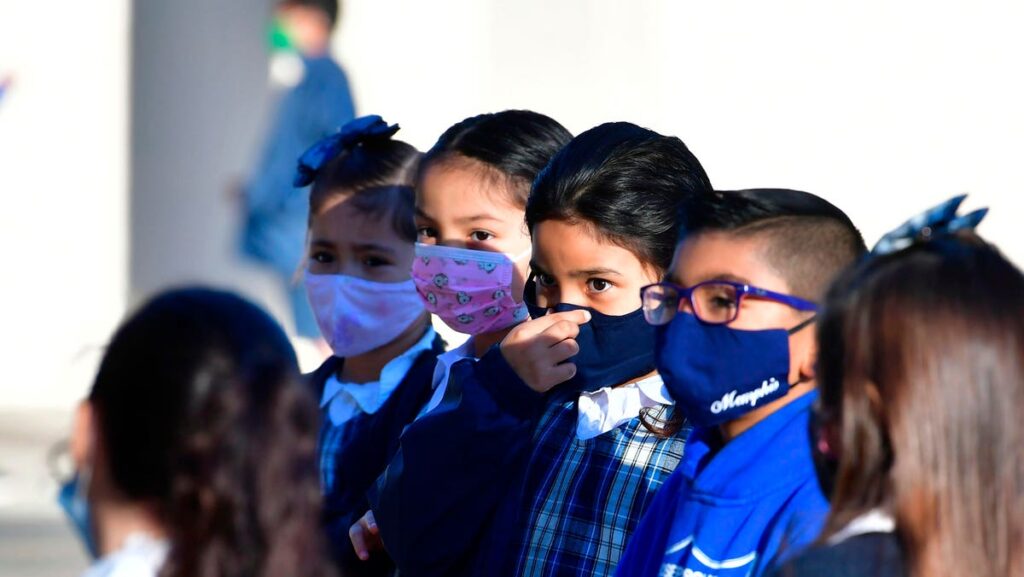Topline
Three recent studies have shown Covid vaccines are effective in children and pregnant people and side-effects like myocarditis or pericarditis are extremely rare, even as many children remain unvaccinated against the coronavirus.
School-aged children stand in a line, all wearing masks.
Key Facts
The Centers for Disease Control and Prevention says myocarditis and pericarditis—the inflammation of the heart and the outer lining of the heart, respectively—are rare reactions that can occur after getting any vaccines, including the Pfizer or Moderna Covid vaccines in adolescents and young adults, and can be developed from contracting the coronavirus itself.
A new study published Monday in JAMA Pediatrics looked at over three million children between the ages of 5 and 17 years old who received almost six million vaccine doses, and found a rare rate of 39.4 cases of myocarditis or pericarditis per one million doses in that age range, and no incidents in kids aged 5 to 11 years of age.
A January JAMA Pediatrics analysis examined 17 different studies and found the two mRNA-based vaccines (Pfizer-BioNTech and Moderna) were safe for use in kids age five to 11, with a risk of developing myocarditis of 1.8 per one million doses, and protected against severe symptoms, hospitalizations, the development of other diseases.
A separate study published Friday in JAMA Network Open found that Covid bivalent boosters—or vaccine shots updated for more recent coronavirus variants—could have averted more than five million missed days of school in kids five to 17 and 10,000 hospitalizations in kids aged zero to 17 if they were adopted as widely as flu vaccines.
If bivalent boosters were less widely adopted than flu shots but more widely adopted than right now—as less than 20% of the U.S. population has received a booster—they could prevent almost three million missed days of school in kids five to 17 and almost 1,400 hospitalizations in those aged zero to 17, the same study found.
Another study published Friday in JAMA Network Open examined a potential link between Covid vaccines administered during pregnancy and spontaneous abortion and found there was no association.
The CDC has cosigned the vaccines’ effectiveness in all approved age groups, and all vaccines currently in use have been authorized by the Food and Drug Administration.
Big Number
32.9%. That’s the share of U.S. children ages five to 11 who had received their primary vaccination series as of early May, well below the national rate of 69.5%, according to the CDC. Younger children are even less likely to be vaccinated—some 6.1% of children ages two to four are vaccinated, along with 4.7% of children under two—though 61.8% of children 12 to 17 have received a Covid-19 vaccine.
Vaccines Available For Kids
The Food and Drug Administration has either approved or given emergency authorization to three coronavirus vaccines for use in children:
- Pfizer-BioNTech’s vaccine covers children ages six months to 17 years. It was granted emergency authorization for use in kids five to 11 in October 2021 and authorized for those six months to four years in June 2022. For kids six months to four years old and 12 to 17, three shots must be administered, and two shots are recommended for kids ages five or six through 11—spacing for the shots varies by age group.
- Moderna’s vaccine covers children ages six months to 17 years. This vaccine was given emergency authorization in June 2022. Moderna’s vaccine for kids of all ages requires two shots administered four to eight weeks apart.
- Novavax’s vaccine is only approved for kids 12 years of age and older. It was granted emergency authorization for this age group in August 2022. This vaccine requires two doses administered three to eight weeks apart.
How Do Covid Vaccines Work?
Three different types of Covid vaccines are approved in the U.S., all of which work differently. The first is Johnson & Johnson’s viral vector vaccine, which is only approved for use in adults. This vaccine uses a harmless, modified version of a different virus from the same family as the common cold, not the one that causes Covid. It’s injected in the body and delivers DNA to the body’s cells. The DNA then tells the cells to make copies of the spike protein that’s on the Covid virus, which helps the immune system look out for similar proteins and prepare antibodies to fight off the virus that causes Covid. Moderna and Pfizer-BioNTech are messenger RNA (mRNA) vaccines. These vaccines use mRNA, which helps give instructions to the body’s cells, to make small parts of the Covid virus that create an immune response in the body. Lastly, Novavax’s protein subunit vaccine contains pieces of the spike proteins found on the coronavirus and an adjuvant, which helps the immune system respond to the spike protein. Once the immune system learns how to react to the spike protein, it’s able to make antibodies and attack the virus.
Tangent
As vaccination rates among children lag, some high-profile commentators have raised doubts about the vaccines—despite studies demonstrating their safety for the vast majority of children. Podcaster Joe Rogan infamously said in 2021 that young, healthy people should not get the Covid vaccines. Meanwhile, Politico reports that Florida Surgeon General Joseph Ladapo recently was criticized by members of the medical community for allegedly altering a state-driven Covid study to suggest the Moderna and Pfizer-BioNTech vaccines were more dangerous to young men than previous findings suggested.
Further Reading
Covid Vaccines: Here’s Evidence They Work—Despite Persistent Misinformation—Along With Side Effects And Common Misconceptions (Forbes)
Covid’s No Longer A Public Health Emergency: Here’s How That May Affect You (Forbes)


